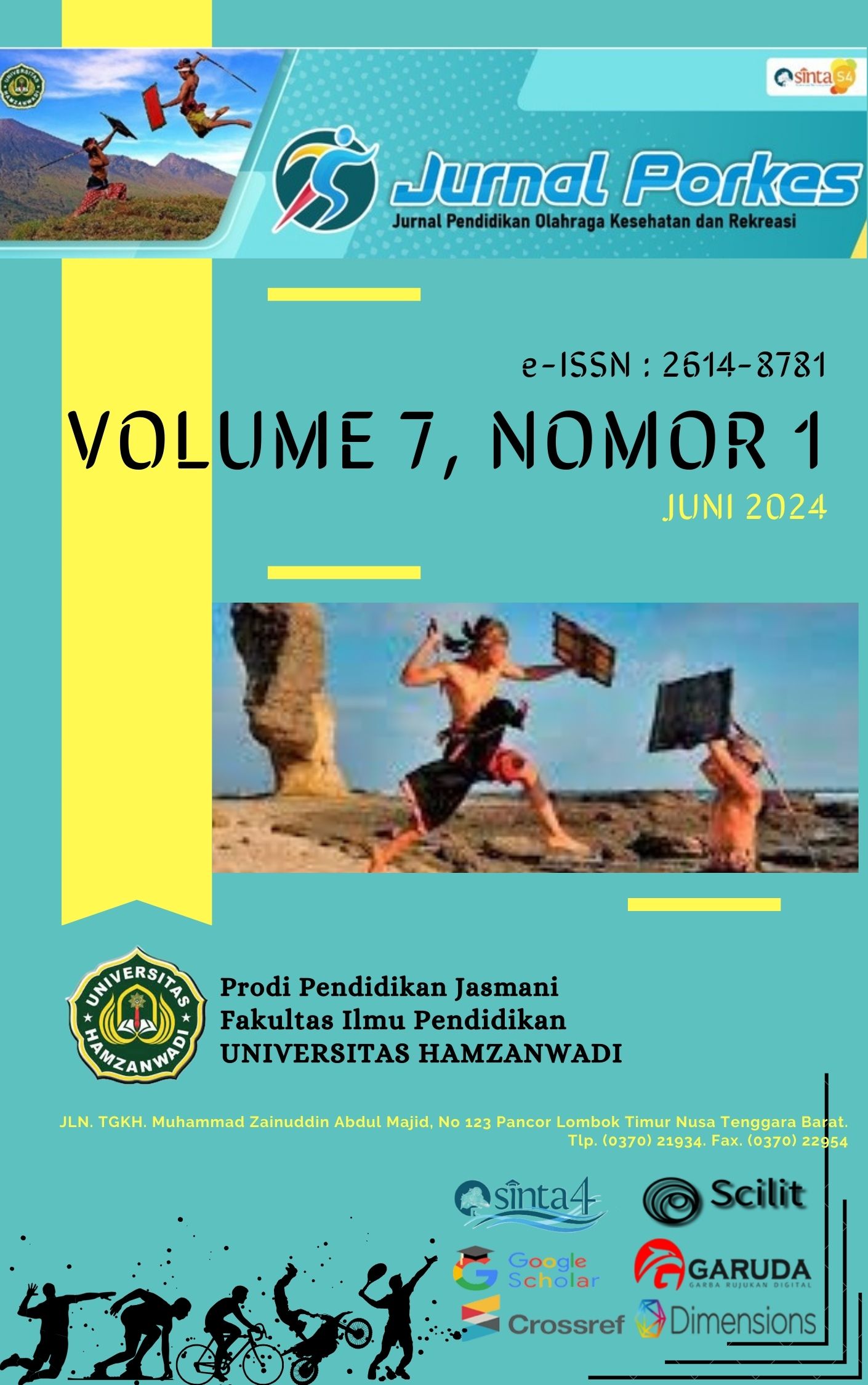Pengaruh latihan wall body reaction terhadap latihan reaksi di cabang olahraga anggar
DOI:
https://doi.org/10.29408/porkes.v7i1.25292Keywords:
Fencing, reaction exercise, whole body reactionAbstract
The purpose of this study was to determine the relationship of whole-body reaction training to reaction training, In fencing training, speed and accuracy are key factors to achieve victory in matches. Therefore, wall body reaction tools have been developed to help fencers improve their reaction ability. This research is correlational research, the method used is a survey with data collection techniques using tests and measurements. The sample of this study was Surabaya and Sidoarjo fencers, totaling 13 athletes. data analysis using the help of SPSS application Version 26.00. The results of this study showed that there was a relationship between visual Whole Body Reactions exercise with Reactive Exercise of 0.373 with a value of rx1.y = 0.373 > r (0.05) (13) = 0.553. There is a relationship between visual Whole-Body Reactions and Reaction Exercise of 0.373 with values of rx1.y = 0.373 > r (0.05) (13) = 0.553. and There is a relationship between audio and visual Whole-Body Reactions with Reaction Exercises of 0.453, with values rx3.y = 0.453 > r (0.05) (13) = 0.553. The conclusion of this study is that there is a relationship between whole body reaction exercise and reaction training.
References
Adhi, B. P., Marsini, M., Nevitaningrum, N., & Rohmad, R. (2023). Hubungan Panjang Lengan Terhadap Kemampuan Passing Atas Siswa Sekolah Dasar. Jurnal Educatio FKIP UNMA, 9(2), 548–553. https://doi.org/10.31949/educatio.v9i2.4430
Arikunto, S., (2015). Dasar-Dasar Evaluasi Pendidikan. Bumi Aksara.
Devocht, J. W., Vining, R., Smith, D. L., Long, C., Jones, T., & Goertz, C. (2019). Effect of chiropractic manipulative therapy on reaction time in special operations forces military personnel: A randomized controlled trial. Trials Journal, 20(5), 1–8. https://link.springer.com/article/10.1186/s13063-018-3133-2
Hariyanto, A., Prakosa, M. W. B., & Sholikhah, A. M. (2021). Optimalization of Reaction Time Through Imagery and Concentration Training in Fencing. Jurnal Medikora, 20(1), 36–43. https://doi.org/10.21831/medikora.v20i1.36962
Henjilito, R. (2017). Pengaruh Daya Ledak Otot Tungkai, Kecepatan Reaksi dan Motivasi Terhadap Kecepatan Lari Jarak Pendek 100 Meter Pada Atlet PPLP Provinsi Riau. Journal Sport Area, 2(1), 70. https://doi.org/10.25299/sportarea.2017.vol2(1).595
Isnaini, N. H., & Decheline, G. (2022). Pemasalan Cabang Olahraga Anggar pada Siswa-Siswi SMP di Kecamatan Nipah Panjang Kabupaten Tanjung Jabung Timur. Indonesian Journal of Sport Science and Coaching, 4(1), 1–12. https://doi.org/10.22437/ijssc.v4i1.18187
Megarany, D., & Soenyoto, T. (2021). Dukungan Orang Tua Terhadap Motivasi Berprestasi Atlet Anggar di Kabupaten Batang. Indonesian Journal for Ohysical Education and Sport, 2(3), 88–93. https://journal.unnes.ac.id/sju/inapes/article/view/45709
Munawarah, N., Hamid, A., & Warni, H. (2023). Analisis Daya Ledak Otot Lengan Daya Ledak Otot Tungkai Kecepatan Reaksi dan Ketepatan Serangan pada Atlet Anggar Kabupaten Balangan. Stabilitas: Jurnal Pendidikan Jasmani dan Olahraga, 4(1), 62–72. https://doi.org/10.20527/mpj.v4i1.1929
Nugroho, A. A. (2012). Standar Status Kondisi Fisik Atlet Cabor Perorangan Koni Daerah Istimewa Yogyakarta. Jurnal Jorpres, 8(2), 49–63. https://journal.uny.ac.id/index.php/jorpres/article/view/10293
Pabesak, J. P., & Mulloh, F. (2020). Hubungan Kekuatan Otot Lengan dan Power Otot Tungkai Terhadap Ketepatan Smash dalam Permainan Bulutangkis pada Siswa SMP Negeri 10 Kota Sorong. Unimuda Sport Jurnal, 1(1), 1–4. https://unimuda.e-journal.id/unimudasportjurnal/article/view/500
Prasetyo, Y., Abdillah, S., & Warni, H. (2021). Kontribusi Panjang Lengan Kekuatan Otot Lengan dan Kekuatan Otot Tungkai Terhadap Kecepatan dan Ketepatan Serangan Atlet Anggar Kabupaten Tabalong. Stabilitas: Jurnal Pendidikan Jasmani dan Olahraga, 2(3), 107–111. https://doi.org/10.20527/mpj.v2i3.1056
Pujihastuti, I. (2010). Prinsip Penulisan Kuesioner Penelitian. Jurnal Cefars, 2(1), 43–56. https://jurnal.unismabekasi.ac.id/index.php/cefars/article/view/63
Rimasa, D., & Sartono, H. (2020). Kontribusi Kelincahan dan Keseimbangan terhadap Hasil Serangan Teknik Ballestra pada Olahraga Anggar Jenis Senjata Sabel. Jurnal Kepelatihan Olahraga, 12(1), 39–44. https://doi.org/10.17509/jko-upi.v12i1.24012
Sholikhah, A. (2016). Statistik Deskriptif dalam Penelitian Kualitatif. Jurnal Komunika, 10(2), 342–362. https://doi.org/10.24090/komunika.v10i2.953
Syaquro, A., Rusdiana, A., & Sumardiyanto, S. (2017). Comparison of Whole Body Reaction and Anticipation Reaction Time Between Kata and Kumite in Karater Comparison of Whole Body Reaction and Anticipation Reaction Time Between Kata and Kumite in Karater. IOP Conference Series: Materials Science and Engineering Journal, 180(1), 8–11. https://doi.org/10.1088/1757-899X/180/1/012232
Sugiyono. (2012). Metode Penelitian Kuantitatif, Kualitatif dan R&B (Alfabeta (ed.)). alfabetan.
Umar, T., & Gunadi, D. (2015). Upaya Peningkatan Rasa Percaya Diri Atlet Anggar Solo Menuju Porprov Jawa Tengah Tahun 2013 Dengan Outbound Training di Banyumas. Jurnal Ilmiah Penjas, 1(2), 1–23. http://www.ejournal.utp.ac.id/index.php/JIP/article/view/326
Downloads
Published
How to Cite
Issue
Section
License
Copyright (c) 2024 Rini Ismalasari, Dani Primanata, Arif Bulqini, Afif Rusdiawan, Bhekti Lestari

This work is licensed under a Creative Commons Attribution-ShareAlike 4.0 International License.
![]()
Jurnal Porkes is licensed under a Creative Commons Attribution-Share Alike 4.0 International License







